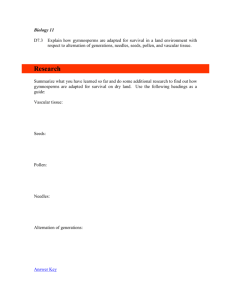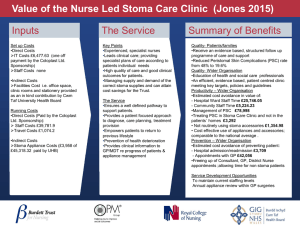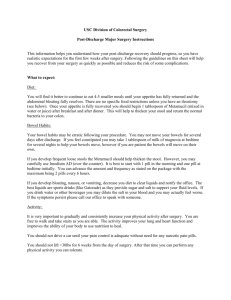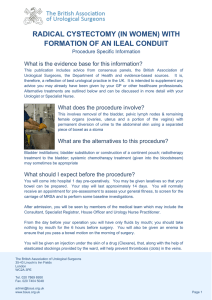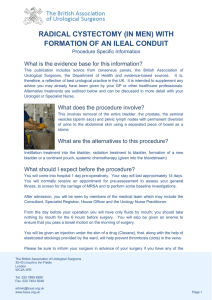Recovery plan: radical cystectomy
advertisement
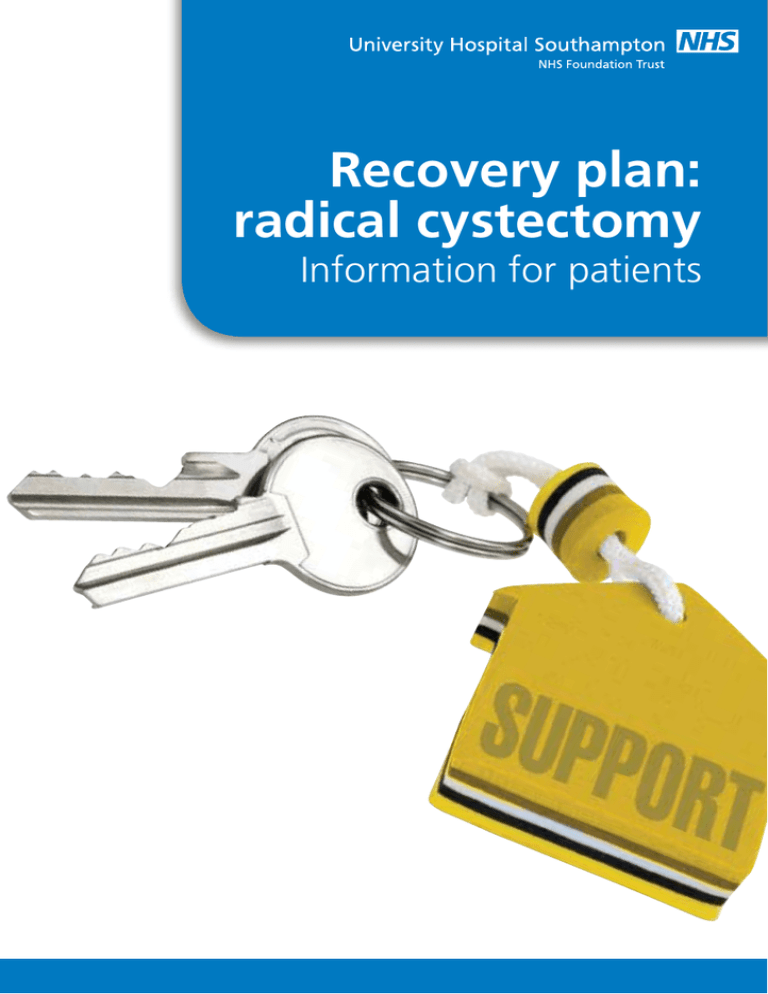
Recovery plan: radical cystectomy Information for patients Help for you following a bereavement 5 This leaflet will help you know what to expect during your time with us. Please take some time to read through what will happen on each day. All these activities should happen as a matter of routine but we encourage you to inform the nursing or medical team if any of the activities do not happen. Days to discharge: seven Day of operation (day 0) Mobilisation (getting moving) After your operation, it is important that you perform deep breathing exercises. Breathe in through your nose and relax the air out through your mouth. You should do this at least five times an hour. The staff will help you sit upright in bed after your operation. We will also ask you to do calf exercises in bed. Eating and drinking after your operation After your operation it is important that you drink, unless you feel sick. Have two or three glasses or cups of water today. You will also be given high energy drinks after waking from your operation. Pain control Good pain control improves your recovery as you can walk about more easily, breathe deeply, eat and drink, feel relaxed and sleep well. You will have had an injection in your back as part of your anaesthetic, called a spinal or epidural. This will help with pain after the operation. In addition you will be given pain relief by mouth, which helps in different ways. You may also have patient controlled analgesia (PCA). This device has a button that you press to give yourself pain relief. There is a security device that prevents you taking too much. The anaesthetist will have discussed these options with you before the operation. Feeling sick After your operation you may feel sick or may vomit. This can be caused by the operation, anxiety, anaesthetic or pain control drugs. You will be given 2 Recovery plan: radical cystectomy Recovery plan: radical cystectomy 3 medication during and after your operation to reduce this, but if you feel sick please speak to your nurse, who will be able to give you something to help. If you have epidural pain relief sometimes your blood pressure may be lower than normal. This will be taken into account when asking you to move around. Tubes and drips Drinking You will have a drip put into a vein in your arm. Fluid will be given through this to ensure you do not become dehydrated. You may also have a tube into a vein in your neck. This can also be used to give fluids and drugs as well as monitoring your heart. There will also be a drain tube on the left side of your abdomen, which will probably be removed tomorrow. You should try to drink about ten to twelve drinks today (about 2000ml). Each cup is usually about 150 to 200ml. You can drink a variety of non-fizzy drinks whilst in hospital. The important thing is to have as much as you feel able without forcing yourself. You will be given high protein, high energy drinks as these will help with healing, reduce your risk of infection and accelerate your overall recovery. We would like you to drink three of these each day. Monitoring While you are in hospital we will check your blood pressure, pulse and temperature regularly. We will also check how much fluid you are taking in and out. Stoma At this stage, the nursing staff will look after your stoma. Over the next few days, the stoma team and nursing staff will teach you how to care for the stoma. There will be two small tubes coming out of your stoma (stents). These tubes help to drain urine from your kidneys. Pain control We will give you regular pain control tablets every six hours. If your pain is well controlled we will remove the PCA today to help you move about more freely. You can ask for extra pain control tablets when you need them. Feeling sick As before, tell the nurses if you feel sick and you will be given medication to help prevent this. Tubes and drips The day after your operation (day 1) Mobilisation On each day after your surgery, we advise you to sit in the chair for a total of six hours, with rests on the bed as needed. By being out of bed in a more upright position and by walking regularly, your breathing is improved and there is less chance of you developing a chest infection or clots in your legs. Your bowel function usually also recovers faster. 4 Recovery plan: radical cystectomy If you are drinking well the drip will usually be removed in the morning. The drain tube will also be removed, providing it is not draining too much fluid. Monitoring Your blood pressure, pulse, temperature, fluid balance and weight will be measured. You will be assessed regularly throughout the day. Recovery plan: radical cystectomy 5 The second day after your operation (day 2) Mobilisation Today you should aim to walk to the end of your bed and back twice, with assistance. Eating and drinking You can start to eat solid food today. It is usually sensible to start with simple foods such as cereal, soup and light desserts. There are no restrictions on what you can drink and we advise ten to fifteen drinks each day. Pain control Eating and drinking You need to continue to eat and drink today. Pain control Your pain control will continue as before. Stoma You may be asked to assist with care of your stoma today. The fourth day after your operation (day 4) You will continue on regular pain control tablets. Monitoring Your blood pressure, pulse, temperature and urine output will be checked regularly throughout the day. You should continue to increase what you eat and drink today, as well as improving your mobility. We would expect you to be able to walk without assistance. Pain control Your pain control will continue as before. The third day after your operation (day 3) Stoma Mobilisation You will be asked to assist with the care of your stoma. Continue to stay mobile as before. We will help you walk to the bathroom. You should continue to do calf exercises while you are sitting or in bed. Eating and drinking Some patients feel distended or slightly sick around this stage of their recovery and you may need to reduce the amount that you are eating and drinking for 24 hours. The doctors and nurses will advise you if you find that this is the 6 Recovery plan: radical cystectomy Recovery plan: radical cystectomy 7 case. The feeling of sickness is temporary and may be because you haven’t opened your bowels. Bowels It often takes three or four days before you are able to open you bowels. When you do mange to open your bowels, it is likely that the stools will be very loose initially. What happens after going home? Complications do not happen very often, but it is important that you know what to look out for. During the first two weeks after surgery, if you are worried about any of the following, please phone the ward (the number is on the back page of this leaflet). If you cannot contact the ward, then ring your GP. Abdominal pain Days 5 to 7 after your operation You should continue to increase your eating, drinking and mobility. We would expect you to be able leave the ward and walk along the hospital corridors. Your pain relief will all be given as tablets. You will be able to look after the stoma yourself, with occasional guidance from the nursing staff. The ‘stents’ in your kidneys will be removed towards the end of this period. This is painless and will happen during one of your stoma bag changes. It usually occurs the day before you are allowed home. Your recovery after surgery If your care needs to change from what is planned in this booklet we will tell you. The most likely problem that you may have is that your bowel stops working for a period of time after your operation (an ileus). This happens to one in three patients undergoing bowel surgery, but in some people this can last a few days or longer. Having an ileus can make you feel sick or you might be sick. If this occurs tell your nurse. We may need to place a tube through your nostril into your stomach as this will get rid of the feeling of sickness. 8 Recovery plan: radical cystectomy It is not unusual to suffer gripping pains (colic) during the first week after surgery to a portion of your bowel. The pain usually lasts for a few minutes and goes away between the spasms. Severe pain that lasts for several hours may indicate a leakage of fluid from the area where the bowel has been joined together. This can be a serious complication, but does not frequently occur. Should this occur, it may be accompanied by a fever. If you have severe pain lasting more than one or two hours, or have a fever and feel generally unwell within two weeks of your operation date, you should immediately contact the ward on the telephone numbers provided. Your wound It is not unusual for your wounds to be slightly red and uncomfortable during the first one or two weeks. Please let us know if your wounds: • Become more inflamed, more painful or swollen • Start to discharge fluid. Your bowels Your bowel habit may change after removal of part of the bowel and may become loose or constipated. Make sure you eat regular meals three or more Recovery plan: radical cystectomy 9 times a day, drink adequate amounts, and take regular walks during the first two weeks after your operation. during the four weeks following your operation until you are back to your normal level of activity. If constipation lasts for more than three days then we advise taking a laxative. The main restriction we would place on exercise is that you do not undertake heavy lifting until six weeks following your surgery. In addition, if you are planning to restart a routine exercise such as jogging or swimming you should wait until about four weeks after your operation and start gradually. Common sense will guide your exercise and rehabilitation. In general, if the wound is still uncomfortable, modify your exercise. Stoma If you have a stoma, your stoma specialist nurse will explain about your this before you go home. If you have any problems with your stoma after you go home, please contact your stoma specialist nurse. You will be given contact details before you leave hospital. Diet A balanced, varied diet is recommended. Try eating three or more times a day. Some people find snacking regularly can be a very useful approach in the first few weeks. You may find that some foods upset you and cause loose bowel motions. If that is the case you should avoid those foods for the first few weeks following your surgery. If you are finding it difficult to eat it is still important to obtain an adequate amount of protein and calories to help your body heal. You may benefit from having three to four nourishing, high protein, high calorie drinks such as Build-up or Complan (available in supermarkets and chemists) to supplement your food. If you are suffering from diarrhoea then it is important to replace the fluid lost and to drink extra fluid. If you are losing weight without trying to or are struggling to eat enough, you may benefit from a consultation with the dietician; ask your GP or consultant to refer you. Exercise Walking is encouraged from day one after your operation. You should plan to undertake regular exercise several times a day and gradually increase this 10 Recovery plan: radical cystectomy Once the wounds are pain free you can normally undertake most activities. When you get home, you will feel extremely tired and will often need to take a sleep during the day. This is normal and will improve during the next four to six weeks. Work You should be able to return to work within six to twelve weeks after your operation. If your job is a heavy manual job then it is advised that heavy work should not be undertaken until twelve weeks after your operation. Driving You should not drive until you are confident that you can drive safely. A good yardstick for this is when you have got back to most of your normal activities. Usually this will be within two to four weeks of surgery. It is important that any pain has resolved sufficiently to enable you to perform an emergency stop and turn the wheel quickly. Hobbies/activities You should consider taking up your hobbies and activities as soon as possible again after surgery. It enables you to maintain your activity and will benefit your recovery. You should not need to restrict these unless they cause significant pain or involve heavy lifting, in which case avoid them for the first six weeks after your operation. Recovery plan: radical cystectomy 11 Enhanced recovery programme Urology department F Level West Wing Southampton General Hospital Tremona Road Southampton Hampshire SO16 6YD Urology clinical nurse specialist Nick Lewis 023 8079 4650 07818 588417 Day of surgery ward E2 023 8079 6471 Surgical high dependency unit 023 8079 6996 Urology ward E7 023 8079 6509 If you need a translation of this document, an interpreter or a version in large print, Braille or on audio tape, please telephone 023 8079 4688 for help. www.uhs.nhs.uk Version 1. Published April 2011. Due for review April 2014. URO02.01 4 Help for you following a bereavement
